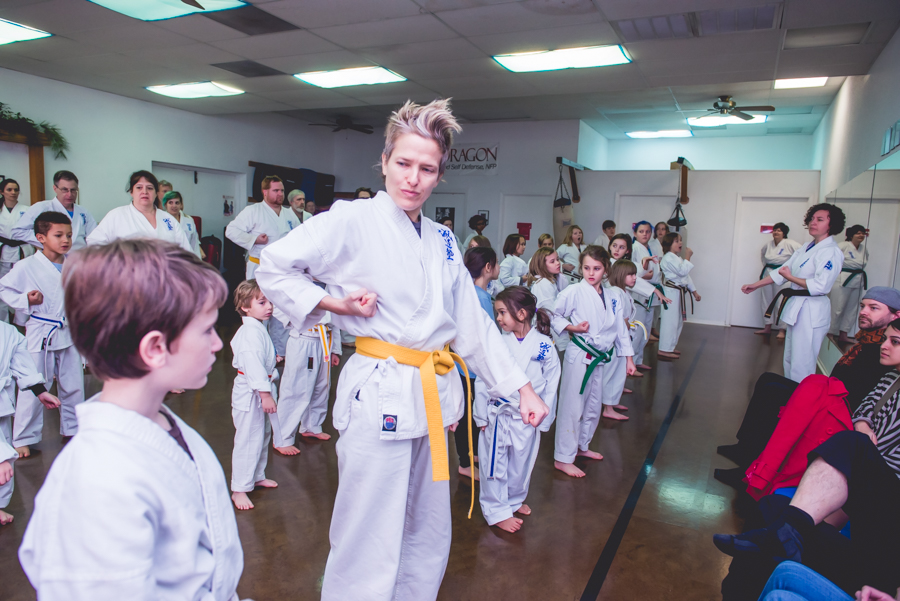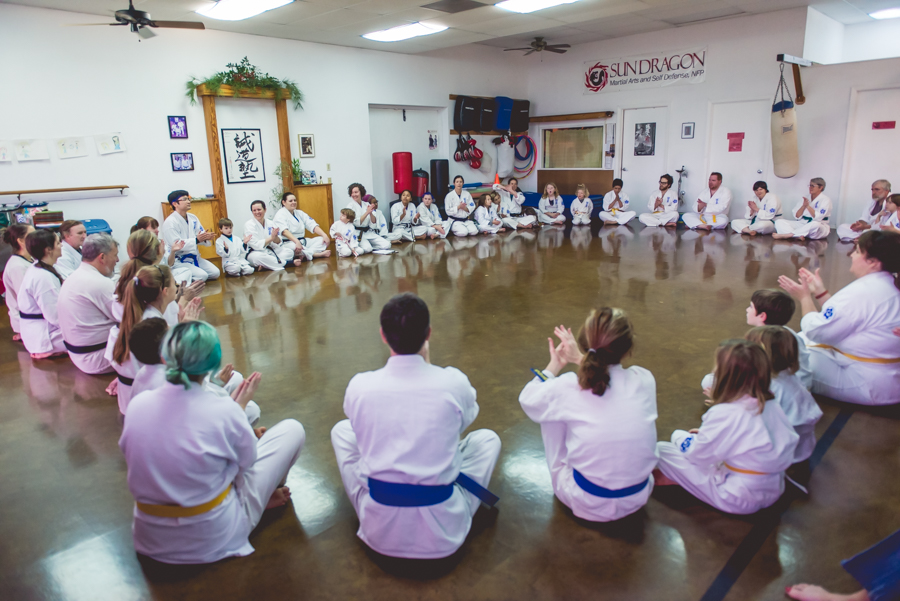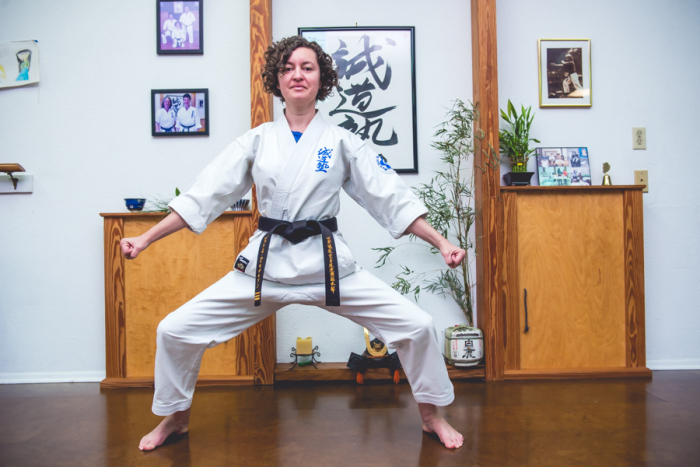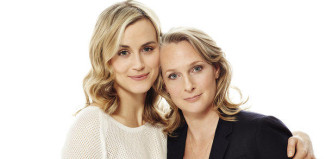Imagine this: It’s the late 70’s and the second-wave feminist movement is in full swing. You’re a woman with a strong presence in the LGBT community and an equally strong desire to practice martial arts. The problem is, you are not particularly welcome in the martial arts schools where you wish to train. You want nothing more but to empower yourself during a time when you’re often treated poorly and left to defend yourself. Now, step out of those shoes and into the dojo at Sun Dragon Martial Arts & Self Defense, a woman-run non-profit karate school, where a safe and affirming environment is offered to all.
While it’s not uncommon to find women, children and LGBTQ-identifying people training in martial arts schools today, that hasn’t always been the case. Sensei Suzanne Pinette, founder of Sun Dragon Martial Arts & Self Defense, knew first hand of the hardships endured by women. So in 1989, she founded Sun Dragon Martial Arts as a Kyokushin Karate school for women and children.
Today, Sensei Joy Williamson leads the school as Executive Director and what once was a martial arts school for women and children only, is now open to students of all genders and backgrounds. The school continues to uphold its same values, supporting the physical and spiritual empowerment of all through training in conflict resolution, self defense, and non-violent martial arts with a focus on individual empowerment, cooperation, and community engagement.
Joined by Senpai Carmel Drewes, Director of Prevention & Healing Programs, Sensei Joy Williamson talks about the history of Sun Dragon Martial Arts & Self- Defense, how the school has evolved over the years, its relationship with the community and what’s to come.
Tell me a little about Sun Dragon and what you think sets you apart from some of the other martial arts schools.
Joy: Well, we are a non-profit school, which is unusual. We do fundraising to support community programs [such as] our violence prevention and outreach programs. We also offer scholarships for anyone who needs one because we want everyone who wants to train to be able to train. That’s one side of it and the other side is that we are really a feminist school and we’re designed to be welcoming to everybody. Our goal is to have an eclectic mix of people and to have a community that’s broad and diverse.
Carmel: Sometimes I talk about us as a school for people who thought that they could never do martial arts. We have a lot of people who train here – a lot of people who feel comfortable with it, but also a lot of people who say, “I never thought that I could do this,” and here they are.
When Sun Dragon was first founded by Suzanne Pinette in 1989, there was a strong focus on women, children and LGBTQ identifying people – why was that?
“We still very much have that core of being an activist school, having community involvement, and being really connected to the social justice movement. Those things have remained in tact.” – Joy Williamson
Joy: Suzanne and many of the women of her generation came up through schools that were not at all welcoming to women. They were maybe the only women in the school. Sometimes they were treated really poorly and sometimes they weren’t allowed to train. So, our school really came out of that feminist movement of the 70s, in which women were wanting to train in martial arts and wanting to develop the women’s self-defense movement. They were really looking for ways to empower themselves and martial arts was one avenue for that.
So, in 1989, when the school first started, it was only for women and then there was a children’s program. But the adult program was all women and that felt very important at the time. That was the way it was when I started training at Sun Dragon.
Carmel: [In relation to the focus on the LGBTQ community or specifically the lesbian community], I think a lot of the activist women were either a part of that community themselves or they saw that as a cause that was very important to be emphasized and focused on. I think we see that in the national and international women’s martial arts community, a lot of the founders were a part of the lesbian community or very close allies of it. I think it was just a natural correlation that happened.
 Since then, in what ways have you grown and evolved?
Since then, in what ways have you grown and evolved?
Joy: We have changed from our first style of karate to a related karate style. We’ve also changed locations many times, and have gone through several iterations, which is exciting. But we still very much have that core of being an activist school, having community involvement, and being really connected to the social justice movement. Those things have remained in tact.
We’ve shifted a little because the environment is a bit different now, which is wonderful and amazing. We wanted to have, again, a broader and more inclusive community and so we had the LGBT focus, but we didn’t have gay [male students] and we really wanted [to include them] so that was part of our thinking in opening up to all genders.
Carmel: And I think that concepts of gender have shifted. The idea of being more inclusive to people who identify in all kinds of ways aligns itself with those second-wave feminist ideals, although at that time they were very focused on women. Now it’s evolved to say, wait a minute, we’re focused on breaking apart this binary and breaking apart misogyny and that means we lose something if we create a category and stick tight to that category of women. That becomes limiting.
Seido Karate is more than just punching and kicking. What other skills and benefits do students take away from training?
Joy: Well, I will even go a little bit further and say that seido karate is really not at all about fights [laughs]. The way I see it, our goal is to create a more peaceful world. So the longer people train and the more skills they have, the less likely they are to actually be in a fight, which to me is the important thing.
“A lot of times in trauma, especially if it’s based around your identity, people have a tendency to develop a complicated relationship with their bodies and their physicality. So a physical training, which is what we do, has the benefit of bringing people back into their bodies and feeling that strength and feeling that pride in their bodies which may have been a target before in the past…”
– Carmel Drewes
So, obviously we learn to kick and punch; that’s part of the practice. But I see [punching and kicking] more as a health and fitness practice than a fighting practice. Our emphasis is on controlling ourselves, so we learn a lot about mental discipline, how to stay calm in a stressful situation, how to resolve conflict peacefully, and how to stand up for ourselves and other people. The fighting part of it is almost more for fun than anything else [laughs].
Carmel: I’m a clinical social worker so I have a background in counseling and have worked with a lot of trauma issues, specifically gender based traumas and sexuality based traumas. A lot of times in trauma, especially if it’s based around your identity, people have a tendency to develop a complicated relationship with their bodies and their physicality. So a physical training, which is what we do, has the benefit of bringing people back into their bodies and feeling that strength and feeling that pride in their bodies which may have been a target before in the past: a target for violence, a target for teasing or shaming or bullying. More than just thinking about it and talking about it, to actually feel that throughout your body is very profound. I think that people can connect with that experience of being back in their bodies in a strong way when at times in the past, your body either didn’t feel strong or you were told that it wasn’t strong or wasn’t powerful.
Joy: Karate is strong because it does different things for different people. So the people who are shy and quiet learn to be a little bit louder and outspoken and confident and the people who maybe need help regulating their emotions get help with that through the practice of karate. So, it’s interesting to me how different it can be depending on where you’re coming from, what your history is and what your natural personality is.

Photo by Devaki Knowles
Tell me more about the relationship between Sun Dragon and the LGBTQ community?
Joy: We have definitely maintained relationships over the years with LGBTQ organizations in town, working with them to teach self-defense classes and doing other kinds of outreach programs. We try to keep that as a priority when we do our outreach work.
Carmel: We’ve taught self-defense at Out Youth, allgo … those are the ones that come to mind. We’ve also taught self-defense here on site, specifically for the LGBTQ community. So, for instance, we’re teaching a workshop in June, a Pride month workshop.
[In addition], we’ve been involved with the new Women’s Community Center of Central Texas, which isn’t specifically LGBTQ focused but is very welcoming to that community and very allied with it.
You guys are also preparing for the Association of Women Martial Arts Instructors Conference, which will be held in Austin this year. Can you tell us a little about the conference and why it’s an important one?
Joy: Well, the organization grew out of the National Women’s Martial Arts Federation, which started in the 70’s as part of that early movement. We’re excited that AWMAI is in Austin this year because a lot of us are going to go. We get to connect with our peers from all over the country. We talk about, you know, how do you address this issue when it comes up with students or how do you teach this skill or how do you run your school or what email program do you use [laughs]. We just get together and brainstorm and take classes, which is fun for me because I teach all the time so it’s fun to be in a class to see what other people are doing.
Carmel: I think it’ll be rare to find someone who is involved with either AWMAF or AWMAI and wasn’t doing martial arts with an activist mindset. Other people go to other conferences [laughs]. People who come to these are people who, no matter what style they’re teaching or where in the world they’re teaching, are teaching with that mindset of inclusivity of all types and social change.
And finally, you all are approaching your 26th anniversary – how are you all celebrating?
Joy: [Laughs] We are taking a year off.
Carmel: We had a big celebration last year for 25.
Joy: Yes, last year we had a big weekend training and we had people come in from all over the country – our friends, teachers and our students here. Our founder Suzanne Pinette came down from Colorado and we had a big blow out weekend. It was so fun and we loved it, but we’re not going to do it again [laughs]. Maybe at 30.
But we’re celebrating that Carmel has come on full time, which is very exciting. So we’re growing our outreach programs and we have some new karate programs that we’re working on. So, that’s our sort of low-key celebration, entering our second 25 years as we’re just expanding and doing more. We’re super excited about that.






































